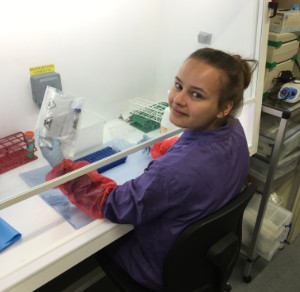#WeAreTogether: University scientist volunteers to boost coronavirus lab tests
30 June 2020

A postdoctoral researcher at the University of Reading is helping NHS frontline staff get back to work safely by volunteering in a COVID-19 testing lab.
Dr Susanne Herbst, a cell biologist, is volunteering at a containment level 3 laboratory at the Francis Crick Institute, London, during the COVID-19 pandemic. The lab, where Susanne worked prior to joining the University, is receiving samples from NHS frontline workers to test if they are safe to go back to work after a period of self-isolation.
A containment level 3 laboratory is used for the isolation and identification of Category 3 pathogens, in which COVID-19 is categorised. Dr Herbst’s role is to bar-code the samples once they come into the lab, then put them into a buffer solution to kill the virus. This ensures that no one who handles the samples in future is at risk of becoming infected. The testing of the samples is done by a PCR (polymerise chain reaction) robot.
The nature of the role requires Dr Herbst to wear the highest levels of personal protective equipment, as pictured. She completes two to three shifts a week, where she receives around 100 samples a day, and is still managing to continue her research with the University into how cells react to drug treatments in Parkinson’s Disease.
Speaking of her voluntary role, Dr Herbst said: “I had not long started my research at the University of Reading when COVID-19 became a worldwide pandemic.
“My former employer, the Francis Crick Institute, put out a call for volunteers to work in its containment level 3 lab and as I already knew the laboratory and its processes it felt like the right thing to do.
“Knowing that I am helping frontline NHS staff get back to work as quickly and safely as possible is very rewarding.”
The University of Reading community is united to tackle COVID-19 #WeAreTogether
